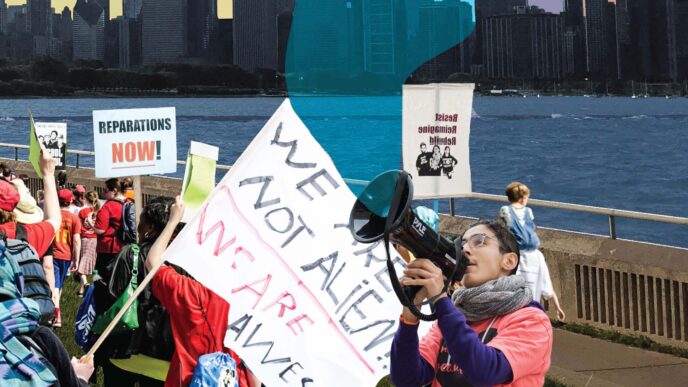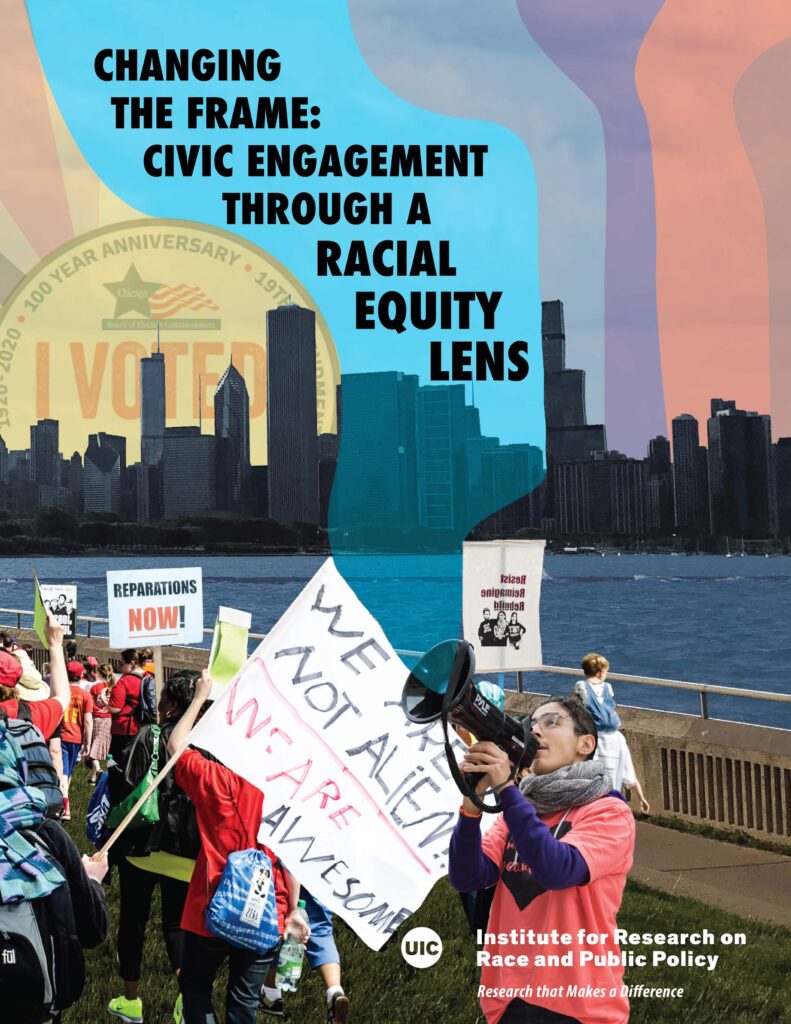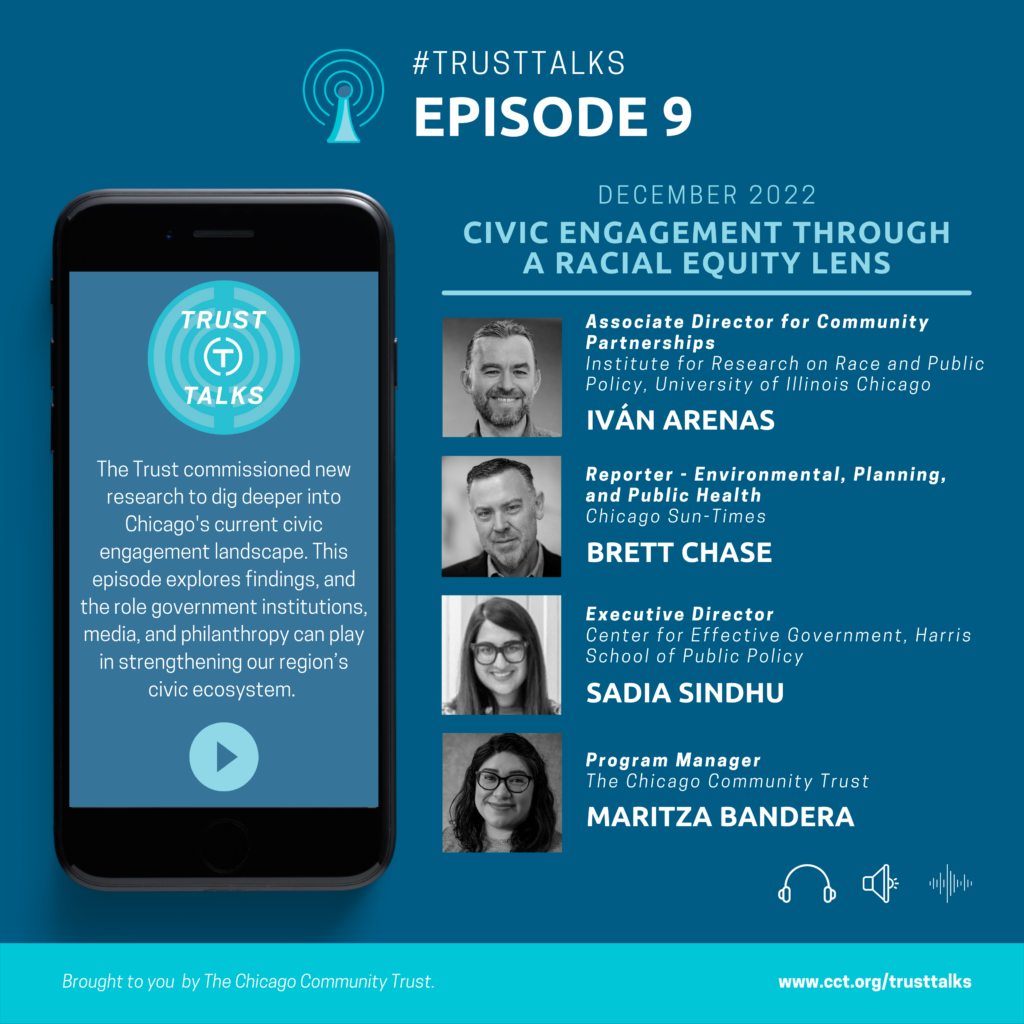
Changing the Frame: Civic Engagement Through a Racial Equity Lens
A new analysis by the Institute for Research on Race and Public Policy at the University of Illinois at Chicago applies a racial and ethnic equity lens to capture a broader analysis of civic life.
Download the Full ReportTraditional measures of civic engagement recognize people using their right to vote or donating their time, money, or labor for the greater good of the community. While these acts contribute to our social fabric, they are not the only ways people engage in civic action, particularly communities of color.
Research Brief: Changing The Frame
This report counters the perception of declining civic participation in Chicago by taking into account the way Black, Latine, and working-class people engage in their communities, from helping their neighbors to organizing civic action.
According to the analysis, race and class differences in civic engagement disappear or reverse when including a wide range of less formal activities and forms of collective organizing practiced among Black, Latine, and working-class people in Chicago. The study also finds racial inequities and the practices as well as policies that reinforce them shape how Black and Latine communities choose to engage in civic participation.


#TrustTalks, Episode 9: Civic Engagement Through a Racial Equity Lens (December 2022)
Under the Trust’s Building Collective Power strategy, The Chicago Community Trust commissioned the Institute for Research on Race and Public Policy at the University of Illinois Chicago to dig deeper into the current civic engagement landscape in Chicago. In this episode, we explore findings from the report, and the role government institutions, media, and philanthropy can play in strengthening our region’s civic ecosystem. Featuring Iván Arenas, Brett Chase, and Sadia Sindhu in conversation with the Trust’s Maritza Bandera.
Key Findings
1
Key Finding
Racial disparities in civic engagement can partially be understood as a consequence of data collection. The U.S. Census Current Population Survey, a prominent survey used to measure civic engagement, defines volunteering narrowly, creating a bias against counting volunteering activities that are disproportionately practiced by Black, Latine, and working-class people, such as informal support networks or public meetings attendance.
2
Key Finding
What is or is not included in definitions of civic engagement can have significant consequences on patterns of racial disparities. For example, if the Current Population Survey considered attending public meetings a form of volunteering, racial gaps in volunteering rates would diminish or even reverse. The white-Black gap would shrink from 11.9 percentage points to 2.6 percentage points. The white-Latine gap would reverse from 12.3 percentage points to a negative 1.6 percentage point gap.
3
Key Finding
Black and Latine communities in Chicago have disproportionately experienced the adverse effects of a range of public policies that increase residents’ sense of marginalization and create barriers to civic engagement. These include school and mental health clinic closures, layoffs in public sector employment, long-term disinvestment, and punitive policing.
4
Key Finding
Despite structural barriers to civic engagement, interviews with grassroots community organizers and analysis of nonprofits in Chicago offer evidence of widespread community investment. Whereas the U.S. Census data showed declining rates of volunteering in Chicago between 2010 and 2019, an Internal Revenue Service data analysis shows a significant increase in the number of new tax-exempt nonprofits in Chicago during that time.
5
Key Finding
Including a more comprehensive array of measures of civic engagement challenges the often-repeated perspective that people of color and working-class people are disengaged or don’t care about their communities. The report documents broad patterns of engagement that suggest many Chicagoans are creative and deliberate political actors working to help their communities and advance the public good.
Report Recommendations:
Ways to Inspire Civic Action
- Civic engagement metrics need to pay attention to how seeking justice and racial equity drives the civic participation of Black and Latine communities. As the report shows, there is extensive evidence of activities that are not counted.
- Public institutions often fail to see the public as partners in finding solutions to the city’s problems. Investing in community organizations and local movements that can rebuild trust between the public and government agencies is one of the most important ways to protect and strengthen the vitality of democracy in Chicago.
- Government officials and politicians looking to increase voting in Chicago’s Black and Latine communities should prioritize policies that address the root causes of inequities in communities of color. Addressing inequities in employment, education, housing, health, and community safety will increase confidence in government effectiveness, heal civic trauma, and encourage greater voter participation in Black and Latine communities.
The Takeaway
The recognition of civic participation within Black and Latine communities is extremely important as we can see a correlation with political education and voter turnout. Continuing to advocate for a changing conception of civic duty will establish an accurate representation of civic health here in Chicago. The Trust believes in civic health as a foundational element in our attempts to close the racial and ethnic wealth gap.